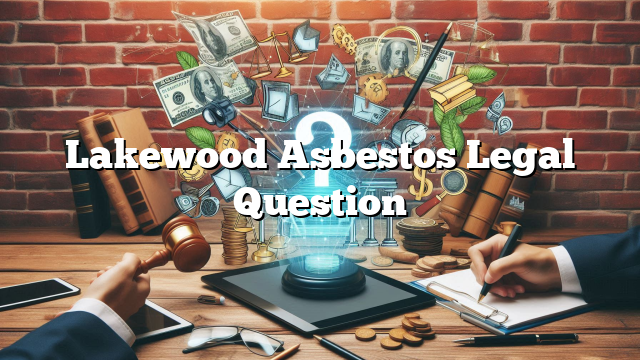Lakewood, like many industrial cities, has a history intertwined with asbestos. Once hailed as a miracle material, asbestos was widely used in construction, shipbuilding, and manufacturing due to its fire-resistant and insulating properties. However, the devastating health consequences of asbestos exposure have cast a long shadow over the community. As residents grapple with asbestos-related illnesses, a complex web of Lakewood asbestos legal questions emerges.
Understanding the Health Impact
Prolonged exposure to asbestos fibers can lead to a range of severe health conditions, including mesothelioma, asbestosis, and lung cancer. These diseases often have a long latency period, meaning symptoms may not appear for decades after exposure. This delay in onset makes it challenging to connect the dots between exposure and illness, further complicating the legal landscape.
Lakewood Asbestos Legal Questions : Navigating the Legal Maze
For those affected by asbestos exposure, understanding the legal process is crucial. The following section addresses common Lakewood asbestos legal questions:
Question 1: What is the Statute of Limitations for Asbestos Cases in New Jersey?
The statute of limitations is the legal timeframe within which a lawsuit must be filed. In New Jersey, the discovery rule applies to asbestos cases, meaning the clock starts ticking when you or should have reasonably discovered your asbestos-related illness. However, specific deadlines exist for different types of claims. Consulting with an attorney is essential to determine the exact statute of limitations applicable to your case.
Question 2: Can Family Members File a Lawsuit on Behalf of a Deceased Asbestos Victim?
Yes, surviving family members can typically file a wrongful death lawsuit if their loved one died from an asbestos-related disease. These lawsuits seek compensation for financial losses, medical expenses, and emotional distress suffered as a result of the victim’s death.
Question 3: What Types of Damages Can Be Recovered in a Lakewood Asbestos Lawsuit?
Potential damages in a Lakewood asbestos lawsuit can include:
- Economic damages: Medical expenses, lost wages, and future earnings.
- Non-economic damages: Pain and suffering, emotional distress, loss of consortium.
- Punitive damages: In cases of egregious misconduct by the defendant.
Question 4: How Do I Find a Qualified Lakewood Asbestos Attorney?
Selecting an experienced asbestos attorney is crucial for maximizing your chances of a successful claim. Look for lawyers with a proven track record in handling asbestos cases in New Jersey. Consider factors like the firm’s size, resources, and the attorney’s reputation.
Question 5: What Evidence is Needed to Prove an Asbestos Case?
Building a strong asbestos case requires compelling evidence. This typically includes:
- Medical records documenting the diagnosis of an asbestos-related disease
- Employment records detailing asbestos exposure
- Testimony from coworkers or supervisors corroborating the exposure
- Expert witness testimony from medical and environmental experts
- Asbestos-containing product identification
Question 6: What is the Role of Asbestos Trust Funds in Lakewood Asbestos Cases?
Many companies that manufactured or distributed asbestos have established trust funds to compensate victims. These funds can provide a source of compensation, even if the company is bankrupt. An experienced asbestos attorney can help navigate the complex process of filing a claim with an asbestos trust fund.
Question 7: Can I File a Lawsuit Against My Former Employer for Asbestos Exposure?
If your asbestos exposure occurred during employment, you may have grounds for a lawsuit against your former employer. However, workers’ compensation laws may also apply. An attorney can help determine the best course of action based on the specific circumstances of your case.
Question 8: How Long Does an Asbestos Lawsuit Typically Take?
Asbestos lawsuits can be complex and time-consuming. The duration varies based on factors like the number of defendants, the complexity of the case, and the discovery process. Patience is key, and working closely with your attorney is essential.
Question 9: What is the Cost of Hiring an Asbestos Attorney?
Many asbestos attorneys work on a contingency fee basis, meaning they only get paid if you win the case. This arrangement can alleviate financial concerns for clients. However, it’s essential to discuss fee arrangements with the attorney upfront.
Question 10: What Support Services Are Available for Asbestos Victims and Their Families?
Several organizations offer support services to asbestos victims and their families. These may include emotional support, financial assistance, and medical information. Additionally, support groups can provide a valuable connection with others facing similar challenges.
Conclusion
The legacy of asbestos in Lakewood continues to impact lives and families. For those affected by asbestos-related diseases, understanding the legal landscape is crucial. By seeking guidance from experienced legal professionals, individuals can navigate the complexities of Lakewood asbestos legal questions and pursue justice.


